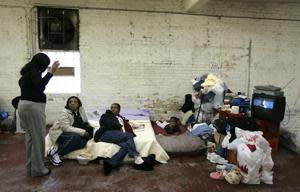 The Lookout
The LookoutSpent, an online game, forces players to confront challenges of poverty

Think you could survive a month in poverty without winding up broke? An innovative online game, Spent, lets you find out.
The project of a North Carolina ministry and an ad agency, Spent asks users to make the kind of choices that low-income people routinely face: whether to pay the electric bill or the phone bill, or whether to pay extra for health insurance with their job or to just hope they won't get sick. The goal is to make it through an entire month without running out of money -- and while hanging on to your home and keeping food on the table.
Since launching in February, the game--which was designed for Urban Ministries of Durham by McKinney, a Durham-based ad agency, has been played over 1.7 million times, in 196 countries, according to McKinney. Visitors spend an average of more than 10 minutes on the site as they try to figure out a strategy to keep their heads above water for the month.
Spent isn't just a challenging mental exercise. It is designed to teach players about the day-to-day realities of the nation's bleak economic climate, with 14 million Americans officially unemployed and a record number living in poverty.
Jenny Nicholson, a McKinney copywriter who designed the game, told The Lookout that teachers from elementary school to the college level have used Spent to help convey to their students what it is like to be poor in America. "That's something I hadn't anticipated," she said.
Not everyone loves Spent. "There is a minority of people who the game makes really angry," Nichols said. These people have often pointed out elements that they find unrealistic--and in some cases, the creators have made tweaks in response.
For instance, in the game some players encounter a plumbing problem that the landlord won't pay to fix. They're forced to either foot the bill or try to fix it themselves. A few people pointed out that the landlord's behavior is illegal, Nicholson said. That prompted her to change the language, noting that the landlord was legally barred from refusing to pay for the fix, but adding that the user had little recourse. Many low-income people can't afford to hire a lawyer, and they feel they can't afford to alienate anyone with power over their living situation, Nicholson said.
It's true that an unusual degree of bad luck--unforeseen medical, housing, and transportation costs, for instance--seems to befall the game's imaginary subject. But Nicholson said that's not far from reality for a lot of people who live paycheck to paycheck. "Maybe all of those things wouldn't happen in one month," she said, "but it could easily happen over two or three months."
Nicholson said Spent has a lot in common with the "Occupy" protests against inequality and political corruption that have taken shape lately from Wall Street to Los Angeles, especially the slogan: "We are the 99 percent."
"It's the same idea," she said. "Challenging some of these people who are making a very good comfortable living to see what it's like on the other side."
Other popular Yahoo! News stories:
• Conservatives: Biden, Wall Street protesters aren't like Tea Party
• McChrystal: Ten years in, goals in Afghanistan only "50 percent" met
